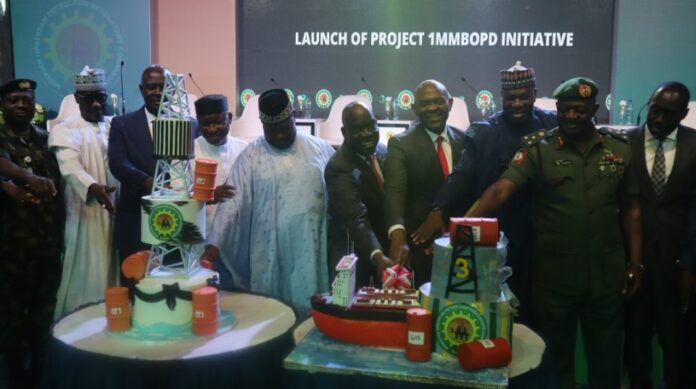- As Stakeholders advocate infrastructure regeneration to boost oil production
CHIGOZIE AMADI
President Bola Tinubu has tasked industry players to collaborate with the Nigerian Upstream Petroleum Regulatory Commission (NUPRC) in realising its One Million Barrels Oil Per Day (1MMBOPD) Initiative.
Tinubu said this in Abuja during the inauguration of Project 1MMBOPD Initiative and commemoration of the third anniversary of the NUPRC under the Petroleum Industry Act (PIA 2021).
The project is a NUPRC collaborative initiative to evolve alternative funding mechanisms to unlock incremental oil production in the short-to-medium term with expanded opportunities for all industry stakeholder groups.
Represented by Sen. George Akume, Secretary to the Government of the Federation, Tinubu charged relevant industry stakeholders to join NUPRC in realizing set goals of incremental oil production targets within specific timelines.
He said the shared responsibility initiative would be a collaborative undertaking, involving government agencies, major producers, service providers, financiers, host communities, and other stakeholders.
This, he said would expand government revenue, eradicate poverty, and increase Gross Domestic Product (GDP) in a sterile, shared prosperity.
“These commitments will be critical in ensuring that we achieve an incremental production in the next 12 months. Growing not just production levels, but also increasing efficiency and competitiveness of our industries.
“This initiative is of national importance and it should support Nigeria’s economic recovery and growth,” the president said.
He said that when his administration came on board, it introduced policy reforms and interventions, and such on the path of stability, growth, and sustainability which had begun to yield fruits.
The president said his administration while focusing on decarbonisation approaches to oil and gas, a renewed drive for economic diversification, usage of oil and gas industrials and development, remained intact.
He expressed delight that the sector had witnessed major financial and investment decisions across the value chain, since inception of the reform.
“To this end, we must work more subtly to grow production, meet domestic energy security needs and shore up foreign exchange gains.
“I congratulate all active oil and gas industry players for the modest gains in oil production which rose to 1.6 million barrels per day.
“I am pleased that the NUPRC, working with industrial stakeholders has transformed that executive charge into a tangible measure set as progress to one million barrels per day in oil and gas production.
“By enhancing domestic energy security and supporting growing vibrancy, this initiative will ensure that Nigeria remains a crucial player in the global energy asset and means of worldwide energy transition.
“Increased oil production will mean more job opportunities, increased revenue for the government, and more stable energy supply for the assets,” he said.
Tinubu commended the Ministers of State for Petroleum Resources (Oil and Gas), NUPRC, NNPC Ltd., industry captains and oil producing organisations for delivering to contemporary challenges to foster development.
However, Oil and gas stakeholders have called for clear roadmap, synergy and pipeline infrastructure replacement to spur oil production.
The stakeholders spoke at the inauguration of the Nigerian Upstream Petroleum Regulatory Commission (NUPRC) Project One Million Barrels Oil Per Day (1MMBOPD) Initiative and third anniversary.
The project is an initiative of NUPRC to evolve alternative funding mechanisms to unlock incremental oil production in the short-to-medium term with expanded opportunities for all industry stakeholders.
Speaking during the inauguration, Vice Admiral Emmanuel Ogalla, Chief of Naval Staff, said NUPRC’s activities were mostly domiciled in the maritime, facing security threats, piracy and pipeline vandalism, among others.
“Nigerian Navy secure maritime assets and environment and monitor activities of vessels to ensure national prosperity,” he said.
Ogalla said enhanced collaboration was required to address the challenges in the sector in order to achieve additional oil production in the country.
In his remarks, Malam Mele Kyari, Group Chief Executive Officer, Nigerian National Petroleum Company Ltd. (NNPC Ltd.), called for replacement of outdated pipeline infrastructure for proper onshore asset production and management.
Kyari thanked the NUPRC management for its inclusive system, and pledged to work together with the commission to achieve more oil production.
Mr Tony Elumelu, Chairman, Heirs Holdings Group and United Bank for Africa (UBA), advocated “Africapitalism,” which would ensure shared prosperity, environmental sustainability and community development.
Elumelu called on international oil companies to increase collaborations with indigenous firms to drive innovation and excellence across the entire value chain, effectively addressing industry challenges.
“Nigeria’s oil production has been on a downward trajectory, falling from peaks of over two million barrels per day to recent lows, below 1.5 million.
“This decline translates to lost revenues, reduced global market share and missed opportunities for national development.
“The root causes are aging infrastructure, security challenges in the Niger Delta, stalled investments, regulatory uncertainties, and a global shift towards renewable energy that has compounded the investment challenge,” he said.
He commended the NUPRC for the 1MMBOPD initiative, adding that it was a crucial part of the solution to unlocking the next phase of development in the sector.
Elumelu called for infrastructural modernisation to upgrade aging facilities, security enhancement, regulatory streamlining, embracing cutting-edge technologies to optimise production and reduce environmental impact.
“By addressing these areas comprehensively, we will not only aim to reach the 1MMBOPD target but also to create a sustainable framework for future growth,” he said.























